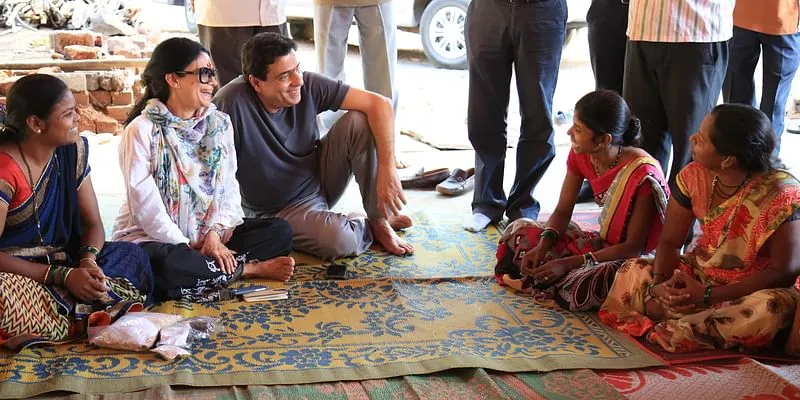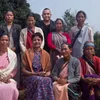Ronnie and Zarina Screwvala are transforming rural India with Dream Village initiative
Dream Village is a rural development programme started by Ronnie and Zarina Screwvala under their Swades Foundation in 2013. It focuses on changing the lives of people below the poverty line in rural India.
In Barasgaon village in Mahad, Raigad, about 200 kilometres from Mumbai, women are leading the change. Chosen by the locals to lead the Village Development Committee, 10 women are on a mission to transform their village into a 'dream village'. The first step was full immunisation against COVID.
Barasgaon village has 150 households and a population of 623 individuals. However, despite the fact that there were negligible cases in the village, the lockdown led many workers to stay at home, negatively impacting families.
A few community members had myths and misconceptions regarding vaccination. The women, who wanted to rid their village of COVID, were immunised first and then they visited every house in the village. They listened to people’s fears, providing essential information via professionals and offering first-hand accounts of other vaccinated community members.

Aditi Tatkare, Member of legislative assembly Shrivardhan constituency-Raigad Maharashtra inaugurating Dream Village Tondusare Jangamwadi in Raigad
As of now, 409 eligible community members have completed their vaccination of two doses.
Apart from this, the women of Barasgaon also run a self-help club and support their family members in dairy farming. They demonstrate the best examples of community ownership, women empowerment, and what makes a village a 'dream village'.
This is just one village among the many that are part of the Dream Village initiative conceptualised by Ronnie and Zarina Screwvala under their Swades Foundation in 2013.
So far, 53 villages have met all the parameters to be declared as Swades Dream Villages under phase one, which means that every rural household has access to an individual toilet, potable drinking water through taps at home, access to healthcare services, an education that makes learning joyous, and the community has opportunities for a diverse range of livelihood. About 22 villages are almost about to complete all parameters. There are 150+ villages in phase two, all in various stages.
The Dream Village programme is essentially a holistic 360-degree rural development model focused on improving and uplifting the lives of below-poverty people in rural India.

Zarina and Ronnie Screwvala interacting with the women of the Dream Villages
“In 2013, we decided to go with the model where we would go into a concentric geography, talk to many villages, find their challenges, and address them, keeping in mind a plan of six to seven years. Because a lot of people do a lot of good work in urban and rural India, but they keep doing it for 10 to 20 years.
“Our philosophy was if you're doing something for a certain period, it needs to end. And the community needs to feel benefitted,” Ronnie Screwvala tells SocialStory.
Empowering the community
Swades helps rural communities by implementing the holistic model of rural development with support from donors.
The model enables rural communities to access clean drinking water in the home through taps. This has brought over 42,000 rural families (more than two lakh people) out of the daily drudgery of walking 1-4 km for drinking water.
Water goes hand in hand with sanitation and Swades ensures that rural communities are free of open defecation by building household toilets. So far, the foundation has supported the building of 26,477 toilets and impacted over 1,13,000 rural lives.

Residents of Swades Dream Village Kansal from Raigad come together, as their village is felicitated with the honour.
Swades also intervenes in healthcare by supporting programmes for children and the elderly, including critical surgeries, cardiac operations, and vision and hearing aids. It supports the district administration of Raigad in its malnutrition interventions.
The last pillar of Swades' holistic model is ensuring that rural households have diverse sources of income and earn a minimum of Rs 2 lakh per annum. For this, it offers support for livelihood initiatives with various on-farm (drip and flood irrigation), off-farm (animal husbandry, fishing nets), and skilling initiatives for rural youth.
Building a sustainable model
Since continuity of the programmes is key, Swades ensures the community contributes a minimal amount. The costs are further subsidised for severely poor and women-headed households. The community also contributes with shram daan (sweat equity).
Community members are not seen as beneficiaries but as equal partners in helping rural India thrive.
“The biggest challenge in the rural community is mental poverty, not physical poverty. We all grew up with aspirations and ambitions because we were often questioned what we wanted to be at schools and colleges. But what happens when you don't ask people? The context was to raise aspiration levels among the community. That is really what prompted us to start the Dream Village initiative,” says Ronnie.

Residents of Swades Dream Village - Vave Haveli in Raigad in Independence Day spirit.
The Dream Village programme aims to create a sustainable governance model, and focus on four core thematic areas: water & sanitation, health & nutrition, education, and economic development (livelihood). These can be replicated at scale across similar geographical coverage.
It helps empower rural communities to shape and implement their own development projects, employ a holistic approach to community development that covers health, education, economic development, and water/sanitation, and install an exit plan that ensures communities are self-sufficient upon the foundation’s departure.
“The biggest problem the government has, in most places, is building that trust. We have seen many people not going to government hospitals as they don’t trust them. On the flip side, you look at the community and find ways to bring them together. So, real sustainability can only happen when most people trust each other,” Ronnie explains.
According to the Swades Foundation, the Dream Village programme has benefitted more than half a million people and operates in 2,500 villages and hamlets in the Raigad district, Maharashtra. The programme works with approximately 1,000 community volunteers and 300 staff.
Explaining the basics
As per a data by IBEF, about 76% of the adult population in India lacks the understanding of basic financial concepts.
The key challenge for Swades Foundation was to make rural communities understand key concepts and build trust among themselves.
“What do you do with money is an easy answer, but to make them understand that actually is difficult. They don't get it. Insecurity creeps in. If I start earning, will I stop getting my government grants?”
For this, Swades Foundation has adopted the financial literacy module of Mandeshi Foundation, a nonprofit dedicated to the economic empowerment of rural women. Seven modules are used to trains Village Development Committees (VDC), who create further awareness and train community members.
The foundation has trained more than 200 VDCs in financial literacy. The training prepares community members to plan weekly, monthly, and annual budgets and put away emergency funds.
Community members are also taught to record their expenses. The training ensures every family member has an individual savings bank account and relies on banks for loans and not on private money lenders.
People who opt for Swades' Economic Development programmes are also trained to calculate their daily person hours and set their income accordingly.
Going forward, the idea is to get geography and build a model in more villages for the Swades Foundation.
Edited by Teja Lele








